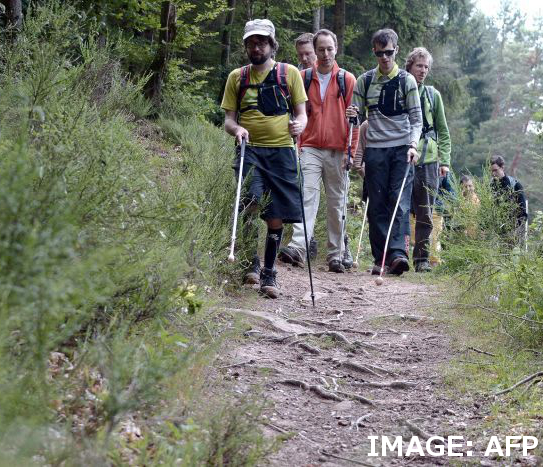Blind hike tests tech limits
 A group of blind hikers has crossed a French mountain range in a bold test of a new GPS system.
A group of blind hikers has crossed a French mountain range in a bold test of a new GPS system.
The Navi'Rando system is a smartphone app that developers hope can help millions of people with vision problems, by plotting a path and guiding the user through it step-by-step.
Armed only with white canes and the experimental app, five hikers – all blind or partially-sighted - trekked 80 kilometres in six days through the wilds of the Vosges range near the French-German border.
It was the largest unguided real-world test for the system developed by a team at Strasbourg University, with hikers following a route programmed in advance by volunteers from the French Hiking Federation.
The route included almost anything that could get in the hikers’ way, such as rocks, edges, precarious turns and risky climbs.
“The thing that's still difficult is using the cane to locate the exact direction of the trail,” said Jean-Claude Heim, an avid hiker who has been blind since birth.
“You really have to concentrate.”
But, he said, the technology made it easier to enjoy “everything the countryside has to offer: the smells, the sensation of touch, the rain, the sound of the birds”.
Fellow hiker Nicolas Linder, 30, said completing the trek without a sighted guide was a big boost to self-confidence and autonomy.
“It's fantastic to rediscover your sense of freedom,” he said.
There are already a number of GPS systems that can help navigate for the blind, but the Strasbourg system “is the first to use inertial measurement units (IMUs) to refine the GPS signal and regularly recalculate the itinerary”, said researcher Laurence Rasseneur.
An IMU is an electronic component that combines data from a gyroscope, barometer and accelerometer to aid navigation. They are usually used in aircraft applications, especially for unmanned vehicles.
“The next step is to make sure this system will work anywhere, even in places where it can't pick up a GPS signal,” said electronics engineer Jesus Zegarra, one of the founding members of the project team.
Mr Zegarra wants a technology to enable “blind people being able to make their way through the corridors of an underground station on their own”.
“We hope this technology will help change people's perceptions about the handicap and improve employment opportunities for the visually impaired,” Rasseneur said.
“The challenge is not technological, it's human... it's a cultural revolution so we need pioneers to show that it's possible.”








 Print
Print